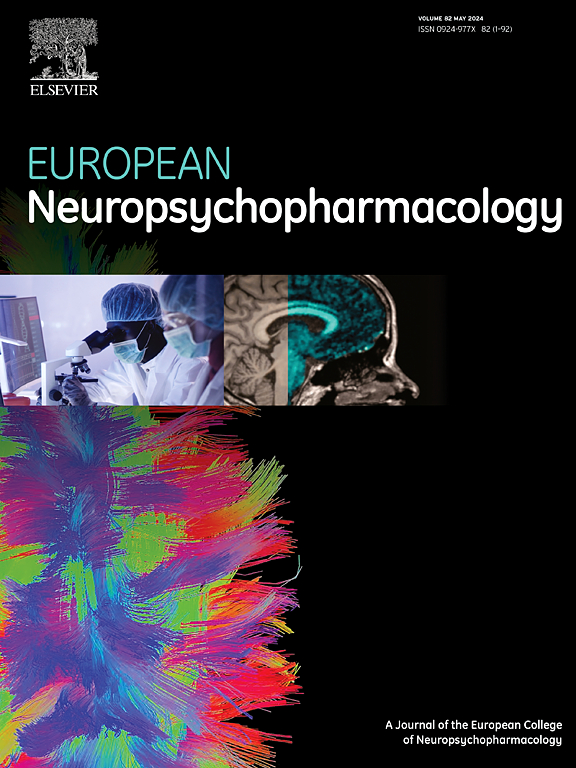评估生理性别对 adhd 表现、发病率和遗传风险的影响
IF 6.1
2区 医学
Q1 CLINICAL NEUROLOGY
引用次数: 0
摘要
注意力缺陷多动障碍(ADHD)是一种神经发育障碍,会损害执行功能、警觉-注意力和动机。因此,注意力缺陷多动障碍患者有较高的成瘾风险,在学业和职业方面表现不佳,并存在社交障碍。表现症状的异质性是公认的,可能导致诊断延迟或漏诊。据报道,多动症的发病率男性是女性的 2 到 7 倍。多动症的发病率在儿童期和成年期似乎是一致的。在儿童期被诊断为多动症的人中,只有一半人报告症状持续存在,这意味着许多人是在成年后首次被诊断,而那些在成年后首次被诊断的人往往会有不同的症状特征。这种性别和年龄趋势可能反映了 "女性性别 "的保护作用、儿童 "成长出 "多动症或成人经历了不同的临床实体。不过,也有人认为,ADHD 的高遗传率(0.6-0.85)和女性相似的遗传风险表明,这些趋势可能是由于症状在环境中的异质性表现(如受女性或成人经历的影响)。我们利用范德比尔特大学医学中心(VUMC)的生物库(n=3,285,882 份电子健康记录(EHR)和 119,750 份基因分型样本)来分析多动症的患病率和遗传结构。我们观察到,与 ADHD 相关的 ICD 代码(n=38,419)在 EHR 记录的女性中出现的频率低于男性(n=14,395 vs. 24,024),而且首次诊断的中位年龄要大得多(21.72 岁,IQR=20.96 vs. 15.05 岁,IQR=9.1)。在 VUMC 进行基因分型的欧洲血统患者子集中(n=69,397),我们观察到多动症多基因风险评分(PRS)是诊断的重要独立预测因子,对女性的影响更大(男性,β=13.47,p=0.03;女性,β=16.90,p=7.4e-7),女性病例的平均多基因风险评分高于男性病例(p=0.04)。在一项性别特异性全表型关联研究(PheWAS)中,无论性别如何,ADHD PRS 都与相似的表型相关,包括药物/烟草使用、其他精神疾病、肥胖、糖尿病和呼吸系统问题。我们的研究结果表明,尽管多动症的诊断率较低,但女性多动症患者似乎具有更高的遗传易感性,这与之前的研究结果是一致的。此外,在弗吉尼亚大学医学院,ADHD PRS 并未显示出基于性别的不同合并症结构。造成这种情况的原因之一是,已有的疾病遗传替代物不能充分反映多动症亚型的特定行为的细微差别,包括但不限于外显多动亚型(ADHD-H)与内隐注意力不集中亚型(ADHD-I)的表现,后者在女性中的报告频率更高。因此,要对女性患者进行临床诊断,可能需要其症状表现在很大程度上与男性患者重叠。在各种电子病历资源方面开展的其他工作可能会进一步揭示 ADHD 相关合并表型的性别特异性趋势的复杂性和细微差别。本文章由计算机程序翻译,如有差异,请以英文原文为准。
EVALUATING THE IMPACT OF BIOLOGICAL SEX ON ADHD PRESENTATION, PREVALENCE, AND GENETIC RISK
Attention-deficit hyperactivity disorder (ADHD) is a neurodevelopmental disorder that impairs executive functioning, vigilance-attention, and motivation. Due to this, individuals with ADHD are at higher risk of addiction, poor academic and professional outcomes, and social deficits. Heterogeneity in presenting symptoms is well-established and may result in a delayed or missed diagnosis. The prevalence of ADHD is reported from two to seven times higher for males than females. The prevalence of ADHD appears consistent in childhood and adulthood. Only half of those diagnosed in childhood report persisting symptoms, implying many are first diagnoses as adults and those first diagnosed in adulthood tend towards a different symptom profile. Such sex and age trends may reflect protective effects of “female sex”, children “growing out of” ADHD, or adults experiencing a different clinical entity. However, others argue that the high heritability of ADHD (0.6-0.85) and similar genetic risk in females suggests that these trends may be due to a heterogenous expression of symptoms in response to the environment (e.g., modulated by the female or adult experience). We use Vanderbilt University Medical Center's (VUMC) biobank (n=3,285,882 electronic health records (EHR) and 119,750 genotyped samples) to analyze ADHD prevalence and genetic architecture. We observed the ADHD-associated ICD codes (n=38,419) were less frequent in EHR-recorded females relative to males (n=14,395 vs. 24,024) and the median age at first diagnosis was substantially older (21.72 years, IQR=20.96 vs.15.05 years, IQR=9.1). Among subset of European ancestry patient genotyped in VUMC (n=69,397), we observed an ADHD polygenic risk scores (PRS) was significant independent predictor of diagnosis, with stronger effects on females (males, beta= 13.47, p=0.03; females, beta=16.90, p=7.4e-7), and female cases having higher average PRS than male cases (p=0.04). In a sex-specific phenome-wide association study (PheWAS), the ADHD PRS was associated with similar phenotypes regardless of sex, including substance/tobacco use, other psychiatric disorders, obesity, diabetes mellitus, and respiratory problems. Our findings that female patients with ADHD appear to have higher genetic liability for the condition despite lower rates of diagnosis are consistent with previous studies. Additionally, ADHD PRS did not demonstrate differential comorbidity structures based on sex in VUMC. One explanation for this is that established genetic proxies of disease inadequately reflect the nuances of particular behaviors of ADHD subtypes, including but not limited to exhibition of externalizing hyperactive subtype (ADHD-H) opposed to internalizing inattentive subtype (ADHD-I), which is reported more frequently in females. Therefore, obtaining clinical diagnoses in females may require symptom manifestations that are largely overlapping with their male counterparts. Additional work in various EHR resources may shed additional light on the complexities and nuances of sex-specific trends in ADHD-associated comorbid phenotypes.
求助全文
通过发布文献求助,成功后即可免费获取论文全文。
去求助
来源期刊

European Neuropsychopharmacology
医学-精神病学
CiteScore
10.30
自引率
5.40%
发文量
730
审稿时长
41 days
期刊介绍:
European Neuropsychopharmacology is the official publication of the European College of Neuropsychopharmacology (ECNP). In accordance with the mission of the College, the journal focuses on clinical and basic science contributions that advance our understanding of brain function and human behaviour and enable translation into improved treatments and enhanced public health impact in psychiatry. Recent years have been characterized by exciting advances in basic knowledge and available experimental techniques in neuroscience and genomics. However, clinical translation of these findings has not been as rapid. The journal aims to narrow this gap by promoting findings that are expected to have a major impact on both our understanding of the biological bases of mental disorders and the development and improvement of treatments, ideally paving the way for prevention and recovery.
 求助内容:
求助内容: 应助结果提醒方式:
应助结果提醒方式:


